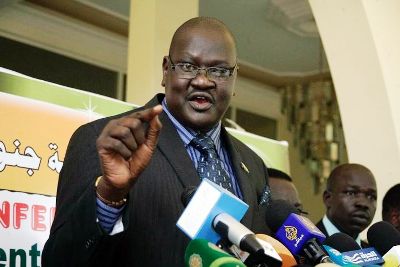Juba asked IGAD nations to deploy troops to protect oilfields: official
March 3, 2014 (KHARTOUM) – South Sudan’s government said it submitted a proposal to the Intergovernmental Authority on Development (IGAD) to deploy 10 battalions to protect its capital, Juba and the oilfields against attacks by rebel groups from Burundi and Rwanda.

Ateny Wek Ateny, the press secretary to South Sudan’s president, Salva Kiir announced the gradual withdrawal of the Ugandan troops from South Sudan’s territory towards Western Equatoria to continue its mission in fighting the rebel Lord’s Resistance Army (LRA).
The presence of the Ugandan army in South Sudan represented a major obstacle to implementing the cessation of hostilities agreement signed in Addis Ababa last January between the government and rebels led by ex-vice president, Riek Machar.
Ateny, stressed in a press conference in Khartoum on Sunday that Juba would accept the proposal for holding a constitutional conference, saying it must be preceded by an agreement on a permanent ceasefire, resettlement of refugees and providing humanitarian assistance for the affected.
He renewed his government’s accusation that the United Nations allegedly supported the rebels, questioning why its mission in Juba never condemned Machar’s forces for “stealing 20 vehicles”.
Ateny further claimed they tapped phone conversations of a senior UN official, allegedly telling somebody in Nairobi, Kenya that the rebels would be assisted if they reached the capital.
President Kiir’s spokesperson said that Machar’s forces fought government army using UN tanks, asserting the government will prosecute the four leaders who were detained in connection with the coup attempt including the former secretary general of the country’s ruling party (SPLM), Pagan Amum, in a military court.
Both pro and anti-government armed forces are responsible for serious abuses that may amount to war crimes in two key oil hubs in South Sudan during recent fighting, the US-based Human Rights Watch (HRW) said in a report last week.
“The wanton destruction and violence against civilians in this conflict is shocking,” said Daniel Bekele, Africa director at Human Rights Watch.
“Both sides need to stop their forces from committing abuses and hold those who have responsible for their actions, and the African Union (AU) should accelerate its long promised investigations”, he added.
But Ateny has criticised the HRW report, accusing the renowned rights body of “taking the side of the rebels”. He also questioned the credibility of witnesses’ accounts that government army committed genocide, describing them as “liars” seeking to secure political asylum.
He said South Sudan was an open country and pointed that war creates a good opportunity for chaos indicating foreign elements might have involved in the incidents.
Ateny also disclosed that they arrested 50 people for involvement in killing on ethnic basis, accusing Machar of exploiting the fact that 75% of his Nuer tribe are army personnel who dragged the country into ethnic war, asserting the latter’s plot failed to achieve its objective.
He accused Machar of launching ethnic war allegedly killing 175 people in Unity state capital, Bentiu and 126 members of the Dinka tribe inside the hospital in Bor, besides committing rape, crimes and killing of nuns inside a church in Bor.
Ateny, however, demanded that Machar forms an investigation committee to look into those accusations and asserted stability of the security situation in South Sudan, saying military operations are restricted to four districts, including two in Jonglei, as well as one Upper Nile and Unity states.
The official also criticised Ethiopia indirectly saying it had a long record of human rights violations.
Conflict erupted in South Sudan’s capital on December 15, 2013 when President Kiir the accused his longest-serving deputy of allegedly staging a coup.
Both sides have been accused of committing atrocities and violence has continued despite a ceasefire agreement signed on 23 January in the Ethiopian capital, Addis Ababa.
(ST)
